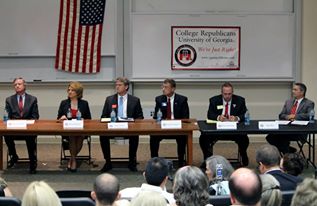By: Andrew Peoples and Rob Oldham

As the sun set over Athens Wednesday, September 18, the curtain began to rise on the race for Representative Paul Broun’s soon-to-be vacant congressional seat as the UGA College Republicans hosted the first Republican primary debate in the Miller Learning Center. As students, volunteers, and concerned citizens filed into the auditorium, the candidates wandered up and down the aisles schmoozing and handing out business cards and fliers. Professor Charles Bullock then directed the six candidates, five men and one woman, to the front tables, where they took their seats and prepared for a night of agreeing that America is great, Obama is destroying it, and Ronald Reagan never would have allowed such nonsense to happen.
This being the 10th district of Georgia, a Democrat has roughly the same chance of winning as a convicted felon, so one of the candidates in this debate will almost certainly be Athens’ next representative in Congress. The debate, which took place exactly eight months and two days before the primary, was the first peek into the different styles and policy ideas of our city’s potential congresspeople, and differences gradually emerged. The seating arrangement of the candidates seemed to serve as a rough guide to their views, with the far left side of the table wanting a balanced-budget amendment while the other end found most of the federal government to be utterly unconstitutional. It was a fairly narrow field.
Seated on the left end was Gary Gerrard, who emerged early on in the debate as the most moderate of the field. The only candidate to criticize the idea of deporting “12 to 15 million people” he took the mildest stance by far on immigration policy, adding that illegal immigrants “who are willing to work and pay taxes” should be allowed to stay in the United States. He was less willing than the other candidates to agree to cut every program in the federal budget or declare the government’s practices unconstitutional. Rather he was alone in acknowledging that the Supreme Court gets to decide what is constitutional and what is not. Calling Gerrard a centrist may be a bit of a stretch, however, as he claimed he would accept no revenue increases and argued for a balanced-budget amendment, going so far as to swear a pledge not to take a congressional salary until Congress passes a balanced budget. While he may toe the conservative line on certain issues, Gerrard seems to be a centrist’s only hope for a congressman who will not further polarize an already divided Congress.
Donna Sheldon, the former head of the Georgia State House’s Republican caucus, was seated to the right of Gerrard and seemed to have the least to say out of all of the candidates in the debate. She ably demonstrated her political experience, dodging questions left and right and relying heavily on rhetoric and broad appeals throughout the evening, criticizing the President for his 2009 “apology tour” in response to a question about Syria, vaguely complaining about regulation and falling back on the debate’s constant refrain of attacking Obamacare when asked about the economy. What policy stances she did take were resolutely conservative, such as when she professed to be proud of being in the Georgia Assembly when it passed the toughest immigration law in the country. Whether her lack of substance was the cause or result of her success in the Georgia House, she seems now to have little plan for her role in Congress if elected.
Mike Collins, who was seated to the right of Sheldon, is a business owner. And due seemingly to a lack of other credentials, this is practically the only thing he chose to talk about during the debate. He wants to cut taxes and regulations on small businesses, like his own trucking company, and wants to repeal Obamacare to protect these businesses as well. He also seeks to abolish the IRS, partially to protect businesses like his trucking company. He did have some policy ideas, all quite conservative, such as cutting the estate tax, the capital gains tax, and basically all taxes for that matter, as well as a stated opposition to amnesty for illegal immigrants. His relative lack of policy specifics comes for the opposite reason than Sheldon’s—being a relative political novice, he also did not seem to have that much to say.
Steve Simpson, seated to the right of Collins, and his representation of the military-minded constituency of the Republican Party managed to hold the attention of the audience. The College Republicans’ straw poll had Simpson capturing the plurality of the vote at around 40 percent. Simpson, a former Army Lt. Colonel, made his personal ties to the military clear when he recounted how his own son, currently a service member, does not even have bullets to shoot on the range due to the sequester budget cuts. His opposition to military cuts was the debate’s only suggestion of anything less than wholesale spending cuts and could be interpreted as a brief detour into bipartisanship, but in reality, preventing defense cuts is pretty standard conservatism. Simpson attempted to appeal to his young audience by suggesting tying the interest rates on student loans to the market instead of to congressional legislation. He failed to discuss the merits of this strategy or mention how it would help, but straightforward answers are rarely the strong suit of aspiring politicians.
The candidate with the most detailed agenda of the night was Brian Slowinski, seated to the right of Simpson. The former Columbia County GOP chairman identifies as a Tea Partier and has apparently thrown the old strategy of appealing to the median voter into the wind. Slowinski flexes his conservative guns by suggesting the total abolition of the IRS, the Department of Education, and the Department of Homeland Security, along with most of the remaining federal government. He distinguished his own debate style by laundry listing wasteful Washington entities that he would downsize or eliminate. No issue was too touchy for Slowinski; he was the lone candidate to address the extraordinarily popular entitlements Social Security and Medicare, which are in a class of their own when it comes to budget proportions. His call to make the programs need-based will certainly alienate older voters who use them as a basis for retirement plans, but Slowinski deserves some credit for addressing a significant spending problem that most politicians, including the other five debating, avoid desperately.
Seated on the far right of the table and representing the strict-constitutionalist wing of the Republican Party was Jody Hice. His constitutional approach to the issues distanced him from much of the pack. His advocacy for stricter immigration law enforcement, even suggesting that cities that don’t enforce illegal immigration laws should be denied federal money, was presented with an extremist passion on par with Simpson’s military rhetoric. Hice’s constitutional interpretation defied some conventional belief, adding flavor to a debate where the candidates’ issue convergence could lull some to sleep. Hice summed up his approach to governing by endorsing Paul Broun’s Four Way Test of legislation. The test focuses on constitutionality, morality, and fiscal conservatism: all three focal points of a conservative electorate that has not OK’d a Democrat in nearly two decades. Hice displayed his strategy clearly by attempting to cast himself as the natural successor to the extremely conservative Paul Broun.
The night was riddled with strong rhetorical appeals from candidates who switched between dodging questions and picking extreme viewpoints instead of laying out realistic plans for public leadership. Members of the audience had to be disappointed by the debate’s inability to break outside of standard campaigning talking points that tend to emphasize different values from the opposition rather than enter into a genuine discussion with them. This being said, even a relatively uneventful night in terms of policy innovation still was telling about the status quo of American politics. Primary races in ideologically stable districts tend to appeal to the more extreme voters. Unfortunately, these polarized attitudes are carrying over into the most divided and least productive congress ever. Citizens of the 10th district have a duty to turn out and make sure that the responsibility of their representation is in the right hands. Voting is even more important in a midterm election where turnout rates are historically low and party extremists carry more electoral weight. So which Obamacare hating, red tape cutting, low tax champion of gun rights and the military will get the nod next May? Turn out to vote, Athens, and you can have a say in the matter.


